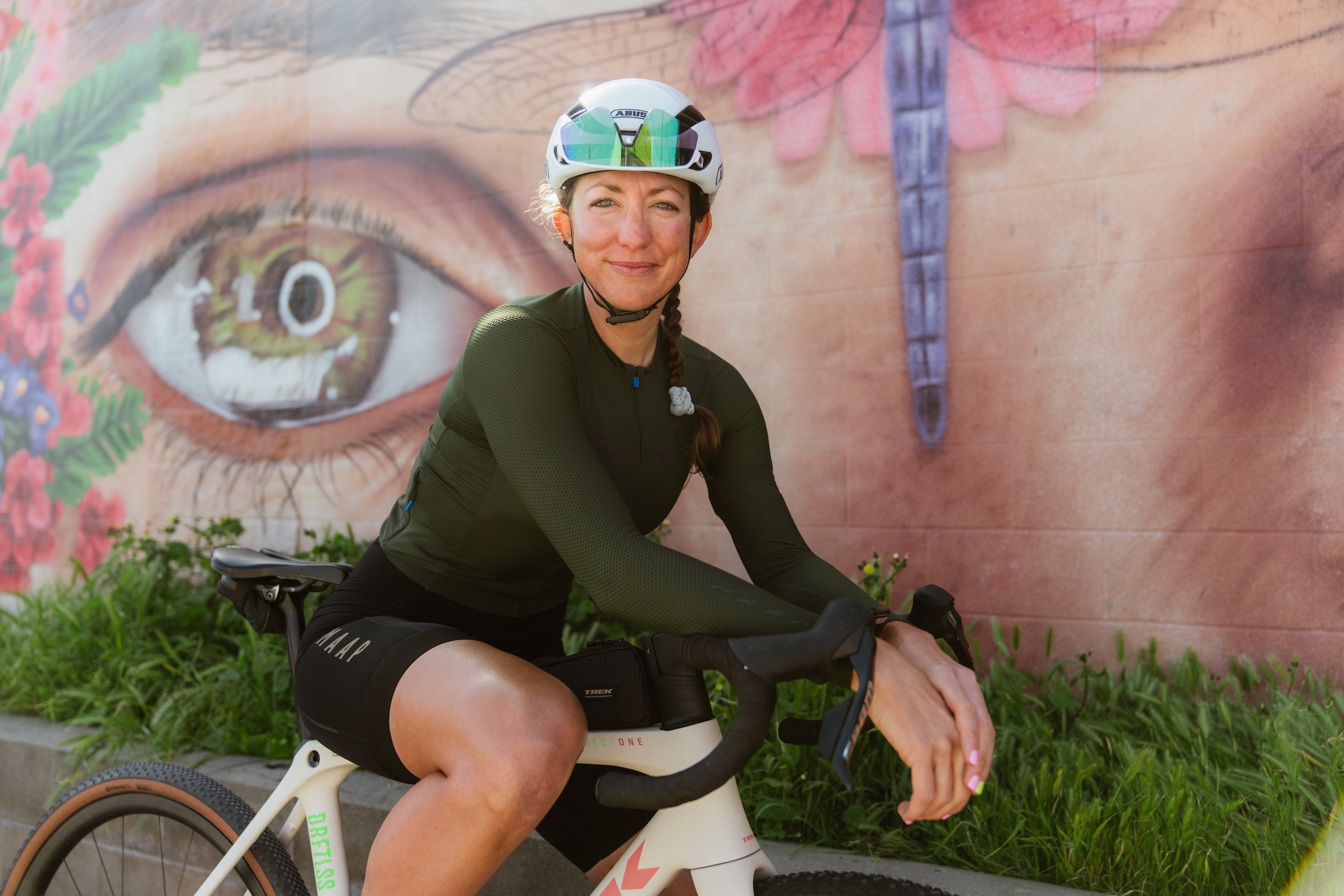Philippa York Analysis: how Tadej Pogačar fulfilled Giro d'Italia expectations
The final conclusions from the first Grand Tour of 2024
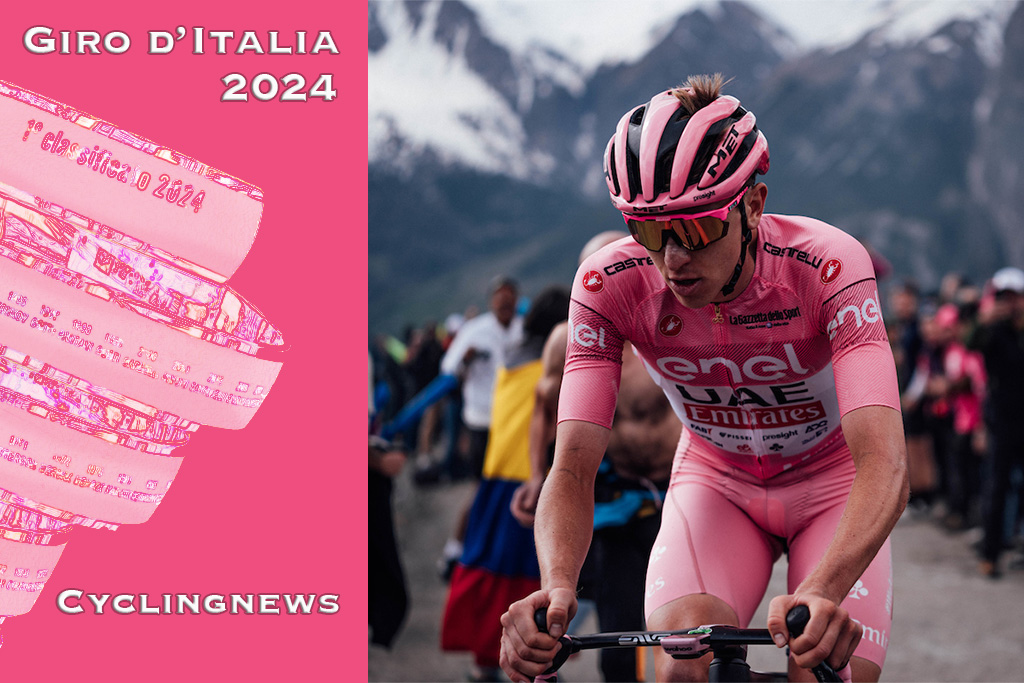
Given the preceding two weeks it was no surprise that the 107th Giro d’Italia came to its expected conclusion. Tadej Pogačar (UAE Team Emirates) came to the start as the stand out favourite, took the race lead on the second day and never looked to be under any great pressure to relinquish the Maglia Rosa. The speculation after the first rest day that UAE Team Emirates might be open to someone else heading the GC standings for a while proved to be just that. A consequence of the race structure meant there were always other teams interested in controlling affairs when Pogačar’s squad didn’t need to do that, so despite the rumours the Slovenian remained in pink. I know I’ve said it before but given how he attacked on the opening stage I think he would have quite liked to have led from start to finish. A la Merckx. The comparisons certainly stack up, taking six stages like Eddy Merckx did in ’63 though only two classifications instead of three for the Belgian superstar. However an almost ten minute lead outdoes even the Cannibal.
The other contenders
You can begin to understand why the other GC contenders came to the realisation that they were in a separate competition and raced between themselves. The few who did try, notably Ben O’Connor (Decathlon AG2R La Mondiale) in the first week and later on Dani Martínez soon paid the price for their optimism. Therefore once Pogačar accelerated the tactics of who could, would or should chase paralysed the group.
I don’t think even Pogačar thought it would be that simple and given he rarely looked at his maximum the energy costs to him were certainly lessened. There’s a massive difference between a self-imposed maximal effort and one that is imposed by a rival. With no one able to test the Maglia Rosa in the way that a Jonas Vingegaard (Visma-Lease A Bike) or Primož Roglič (Bora-Hansgrohe) would then the times that had to ride flat out were pretty limited.
Both time trials and the mountain top finishes where he took two minutes from the other team leaders he probably rode at his maximum but for the other stage wins he seemed really comfortable. It’s all relative, of course, because winning a race hurts, specially atop a climb. Physically he was challenged by the route and the poor weather though I suspect not to the extent his team envisaged, which with the Tour de France next will have been a plus.
As far as mental pressure of being the race leader from day two onwards it looked like Pogačar grew into the role as the days went on. The cost of podium and media duties offset by the growing confidence , not only for him individually but also for his teammates. There was some criticism beforehand but from the first day they imposed themselves on the race at the crucial moments and never really looked to be in trouble. When you realise that most times Rafal Majka set the pace that preempted his leaders attack he was still able to come back to the other GC contenders once recovered. That’s one example but all the others at UAE were equally impressive.
Only Ineos Grenadiers and Decathlon could come close in terms of having support in the mountains for their leaders. However the Pogačar problem was beyond their abilities.
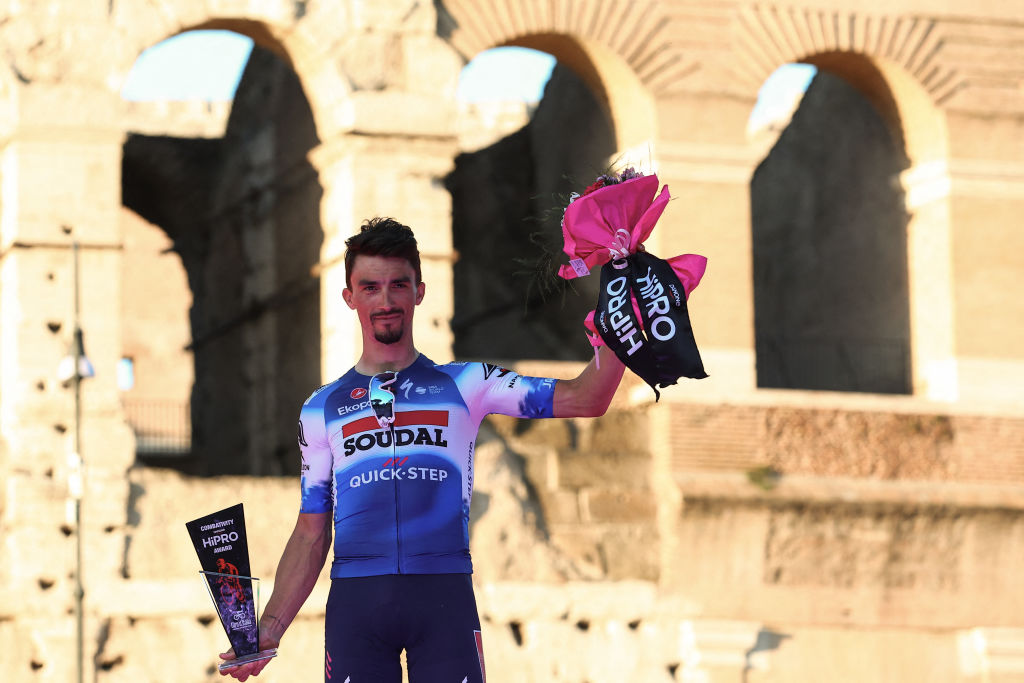
The return of Alaphilippe
As in every Grand Tour talents emerged and others returned. In the latter camp the beacon was Julian Alaphilippe (Soudal-QuickStep). The most combative rider award was deservedly his but the manner in which he was constantly on the offensive reminded everyone of why he has been World Champion twice.
On the revelations side we have new names in the stage racing hierarchy who will progress as they mature further, Antonio Tiberi (Bahrain Victorious) outclimbed Thymen Arensman (Ineos Grenadiers) for the white jersey of best young rider and wasn’t that far behind his rival in the time trials. The Dutchman did have to ride for Geraint Thomas whereas the Italian had the sole leadership for the GC and that kind of situation adds up over the three weeks.
The latest race content, interviews, features, reviews and expert buying guides, direct to your inbox!
I can see Arensman becoming their choice at less mountainous races but for the moment he has Rodríguez, Pidcock and maybe Bernal ahead of him as far as the bigger stage races. Tiberi doesn’t have the same issue at Bahrain though he will be dealing with the tifosi and Italian media watching his every move.
The French will be glad to see another pure climber emerge with Valentin Paret-Peintre catching up with his older brother Aurelien. The results Decathlon AG2R La Mondiale have had on Van Rysel bikes this year have been astonishing and even though Ben O’Connor missed the podium fourth is not to be sniffed at.
EF Education-Easy Post’s Georg Steinhauser winning a proper mountain stage was noteworthy in itself but backing that result up during the rest of the final week was even more remarkable. Compared to Paret-Peintre his climbing is a different style, more rouleur orientated but it was pretty effective. Surviving from the break for each of these riders shows a level of resistance that can be developed further.
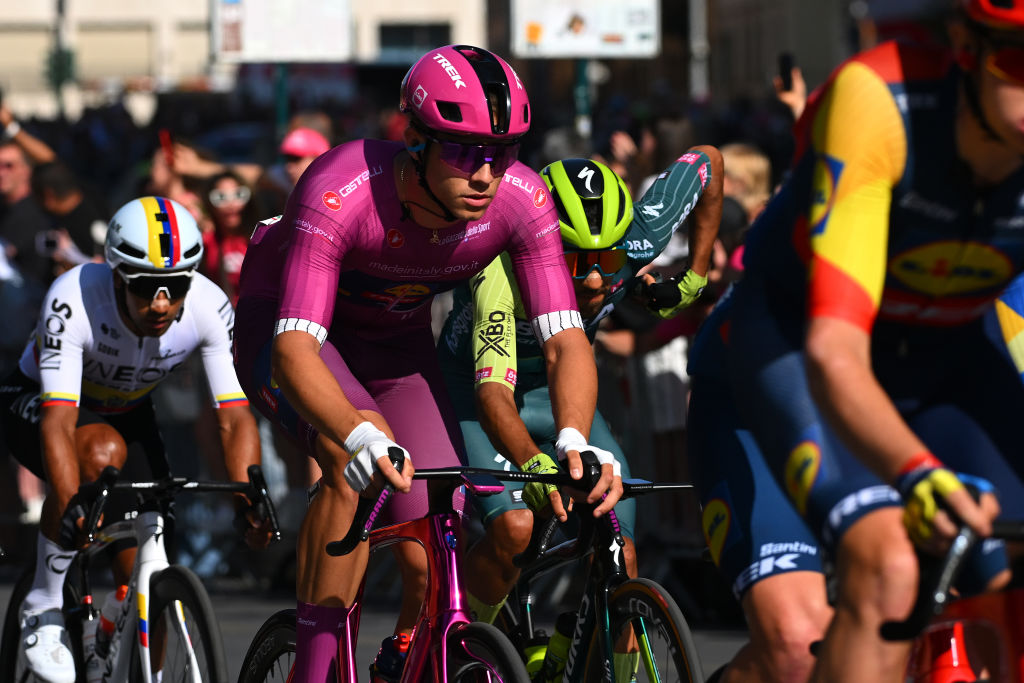
Milan versus Merlier
This Giro was billed as more favourable to the sprinters than usual however with less climbing the racing was more frantic than ever. For a while it looked like Jonathan Milan (Lidl-Trek) would dominate the flat days and building up a massive lead in the points competition was helped by the misfortunes of the other fast men. However Tim Merlier survived the last week climbing with more speed and Soudal Quickstep left the Giro with four victories versus Lidl-Trek’s three. The tall Italian seemed the stronger beginning his sprints from far out and no one able to come around him, Merlier on the other hand with much more of that classic sprinters kick that few could follow. Olav Kooij may possibly have had more success than his one stage win however the continuation of Visma-Lease a Bike’s bad luck saw him drop out and the dominant team of the last few years only had four riders left by the end.
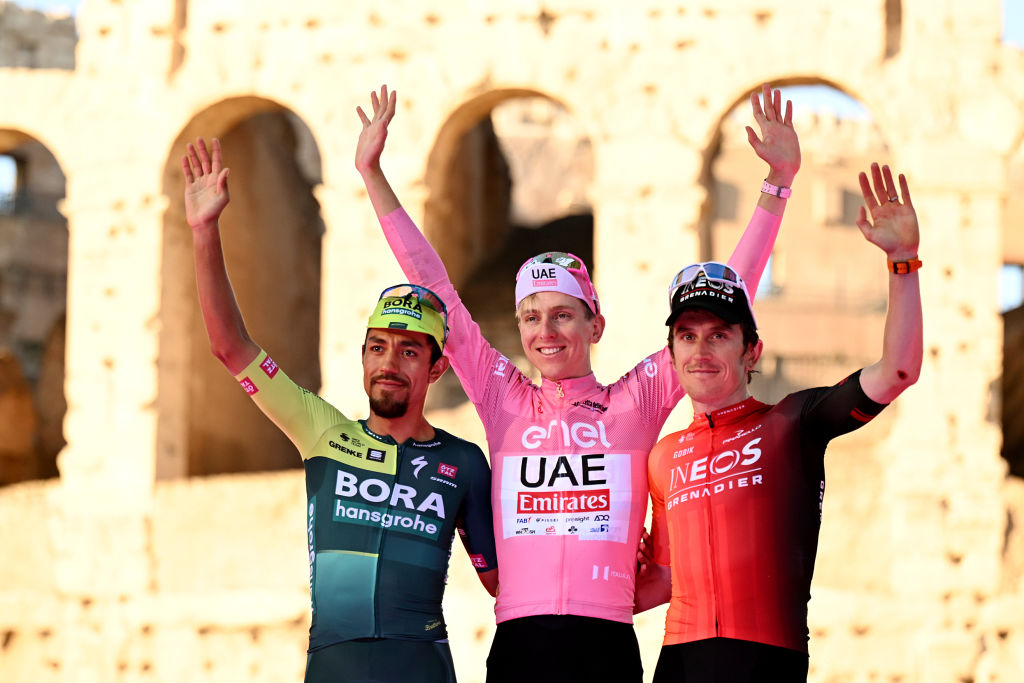
Expectations fulfilled
All in all this, Giro d’Italia fulfilled initial expectations - Tadej Pogačar winning by a large margin, Dani Martínez repaying the trust put in him by Bora and Geraint Thomas being as reliable as ever. Less mountains were meant to encourage more open racing racing which it did for stages but not for the final GC. Some fresh faces arrived and some more experienced ones confirmed they can’t be written off by the new generation of youngsters.
With the TdF next, Pogačar rode a sensible race, turning on the power when he needed to and exploiting the circumstances of the others' squabbling when he might not have thought of the win that day. In the end, only one man took the pink shirt off the back of Pogačar and he got the sunglasses too. The awe and gratitude on Giulio Pellizzari’s face was quite possibly the most touching moment of the race and a reminder, too, that Tadej Pogačar isn’t quite the Cannibal he’s accused of being.
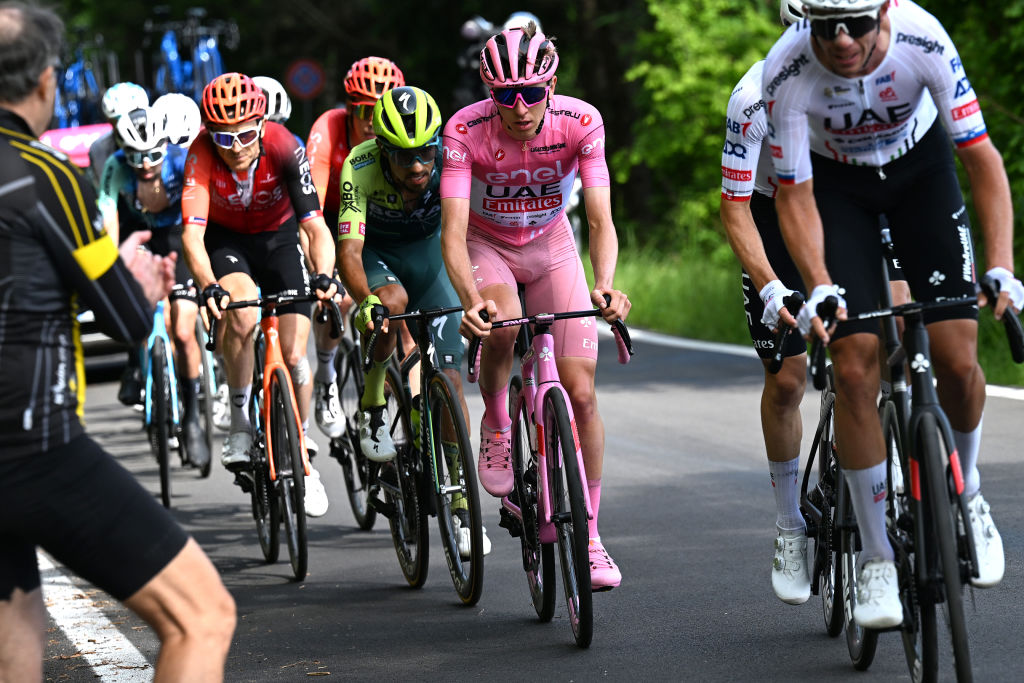
Philippa York is a long-standing Cyclingnews contributor, providing expert racing analysis. As one of the early British racers to take the plunge and relocate to France with the famed ACBB club in the 1980's, she was the inspiration for a generation of racing cyclists – and cycling fans – from the UK.
The Glaswegian gained a contract with Peugeot in 1980, making her Tour de France debut in 1983 and taking a solo win in Bagnères-de-Luchon in the Pyrenees, the mountain range which would prove a happy hunting ground throughout her Tour career.
The following year's race would prove to be one of her finest seasons, becoming the first rider from the UK to win the polka dot jersey at the Tour, whilst also becoming Britain's highest-ever placed GC finisher with 4th spot.
She finished runner-up at the Vuelta a España in 1985 and 1986, to Pedro Delgado and Álvaro Pino respectively, and at the Giro d'Italia in 1987. Stage race victories include the Volta a Catalunya (1985), Tour of Britain (1989) and Critérium du Dauphiné Libéré (1990). York retired from professional cycling as reigning British champion following the collapse of Le Groupement in 1995.

